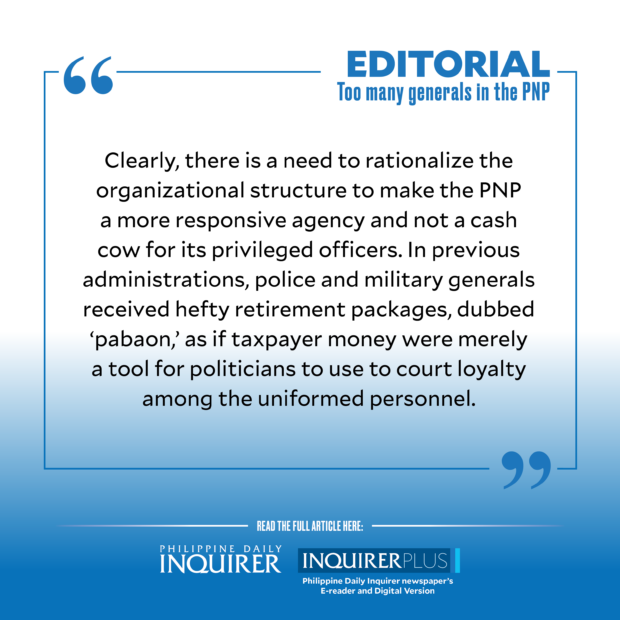Interior Secretary Benhur Abalos recently sought Malacañang’s intervention regarding the issue of “too many generals” in the Philippine National Police (PNP). Coincidentally, more than 100 newly promoted star-rank officers proudly took their oath before President Marcos at the Palace. According to reports, the President led the oath-taking ceremonies of 57 officers on September 20, including four police lieutenant generals, ten police major generals, and 43 police brigadier generals. A week later, on September 27, the second batch of promotions took place, with 55 officers taking their oath, including one police lieutenant general, seven police major generals, and 47 police brigadier generals. In total, 119 officers were promoted to star-rank, with 113 attending the ceremonies in Malacañang.
This flurry of promotions occurred despite a letter issued by the Department of Budget and Management (DBM) last year, questioning the rank distribution within the PNP. In the letter dated October 12, 2022, the DBM noted that there were excessive rank positions amounting to 66,203, with a base pay expense of P26.7 billion as of June 30. The DBM found that there were 35 excess flag positions, with eight lieutenant generals instead of the approved three, 17 major generals instead of 11, and 110 brigadier generals instead of 86. Additionally, there were thousands of excess positions for colonels, lieutenant colonels, majors, captains, staff sergeants, and corporals. Conversely, the DBM and the Department of the Interior and Local Governments (DILG) discovered that there were at least 66,958 vacant positions for lower-rank patrolmen and patrolwomen, despite the DBM’s approved distribution of 129,926 positions. These lower-rank personnel play a crucial role in maintaining police visibility and deterring criminal activities.
Due to the DBM’s findings, Interior Secretary Abalos sought legal opinion from the Office of the President regarding the excessive number of police generals, considering that there is no law authorizing the increase in the number of commissioned officers in the police force. The DBM clarified that the creation of such positions can only be done by the legislative branch, except for offices established by the Constitution. It pointed out that the existing laws, Republic Act No. 6975 (DILG Act of 1990) and RA 8551 (PNP Reform and Organization Act of 1998), do not provide for the increase in the number of flag positions. Despite the DBM’s letter and the absence of a law allowing the excess positions, Malacañang proceeded with the promotions of numerous police generals.
Currently, a proposed PNP reform bill, which includes the creation of more flag positions and key commands in the police force, has been approved in the House and is awaiting final approval in the Senate. Speaker Martin Romualdez stated that House Bill No. 8327, approved in August at the lower chamber, includes internal reforms that would make the PNP more responsive to present-day challenges, benefitting the Filipino people whom the PNP aims to protect. Its counterpart, Senate Bill No. 2449, has been submitted for plenary approval in the Senate. Former police chief Senator Ronald dela Rosa, the bill’s sponsor, highlighted provisions that would enhance discipline and excellence within the police force. The bill also proposes setting the police retirement age equivalent to that in the military and giving the PNP the authority to select local police chiefs to eliminate undue influence from local officials. Secretary Abalos referred to these proposed reforms as the first comprehensive overhaul of the PNP since 1998.
Nevertheless, the pending bills fail to address the issue highlighted by the DBM: the top-heavy nature of the police hierarchy. In fact, these bills would further legitimize and institutionalize the numerous flag positions, which not only strain the national budget but have also been linked to abuses within the police organization, as some top-rank officers have been involved in illegal activities. The rampant corruption involving several police generals and their connection to the illegal drug trade has severely damaged the reputation and public trust in the PNP, leading Abalos to call for mass resignations earlier this year to rid the organization of rogue generals. Additionally, the incidents of innocent teenagers being killed by the police in Navotas and Rizal in August highlight the prevailing culture of impunity during the previous administration, wherein the police were responsible for the deaths of over 6,000 drug suspects during the brutal Duterte drug war. Clearly, there is an urgent need to streamline the organizational structure of the PNP to transform it into a more responsive agency, rather than just serving as a means for privileged officers to gain financial benefits.
If the proposed PNP reform law intends to truly live up to its name, Congress must address the imbalanced structure of the PNP while there is still time.
Denial of responsibility! Vigour Times is an automatic aggregator of Global media. In each content, the hyperlink to the primary source is specified. All trademarks belong to their rightful owners, and all materials to their authors. For any complaint, please reach us at – [email protected]. We will take necessary action within 24 hours.


